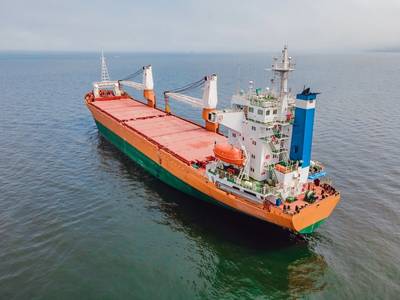Britain Warns Russia May Start Attacking Civilian Ships
Britain has information indicating the Russian military may move beyond attacks on Ukrainian grain facilities to target civilian shipping in the Black Sea, Britain's U.N. Ambassador Barbara Woodward said on Tuesday.
British Prime Minister Rishi Sunak shared the information with Ukraine's President Volodymyr Zelenskiy during a phone call on Tuesday, Woodward said.
Britain's information also indicates that Russia has laid additional sea mines in the approaches to Ukrainian ports, she said.
"We agree with the U.S. assessment that this is a coordinated effort to justify and lay blame on Ukraine for any attacks against civilian ships in the Black Sea," Woodward told reporters.
Russia's mission to the United Nations in New York did not immediately respond to a request for comment.
The White House gave similar warnings last week about possible attacks on civilian ships and sea mines.
The U.N. Security Council is due to hold back-to-back meetings on Ukraine on Wednesday.
The first, requested by Russia, is to discuss Russian accusations of Ukrainian persecution of the Moscow-linked Ukrainian Orthodox Church (UOC). Ukraine has accused the UOC of maintaining links to the pro-invasion Russian Orthodox Church, but the UOC says it broke ties last year.
The second meeting, requested by Ukraine, will discuss recent Russian attacks on civilian infrastructure and ports and Moscow's "attempts to weaponise global food supplies," Woodward said.
Russia last week quit a deal that had allowed the safe Black Sea export of Ukrainian grain for the past year, saying that demands to improve its own food and fertilizer exports - which are not subject to Western sanctions - had not been met.
Since Russia quit the deal and began attacking Ukrainian food-exporting ports on the Black Sea and Danube river, global wheat and corn futures have risen sharply. The U.N. has warned that the most vulnerable will pay the highest price.
Russian President Vladimir Putin is due to host African leaders in St. Petersburg this week and has promised free Russian grain "to replace Ukrainian grain." Moscow had complained that not enough Ukrainian grain went to poor countries under the Black Sea export deal.
The U.N. argued that the deal benefited poorer countries through lower global prices.
"It would be wonderful if African leaders were really strong in their messaging to President Putin," said Woodward, adding that Russia's investment in Africa was about 1% of Africa's GDP. "Russia is not driving Africa's growth. Russia is driving Africa into poverty."
(Reuters - Reporting by Michelle Nichols; editing by Rami Ayyub and Christina Fincher)














